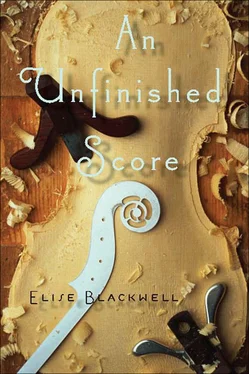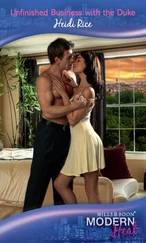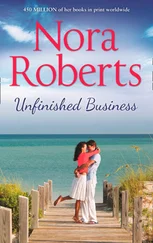Elise Blackwell
An Unfinished Score
She hears the words on the radio. It is the radio that announces her lover’s death. His is not a household name, not in most households, but he happens to be the most famous person on the plane that went down. The plane’s wreckage, strewn across Indiana farmland, is being examined for clues. Crews search for the voice recorder, the black box that holds the secret of two hundred seventy-one deaths. Two hundred seventy, plus one.
Suzanne’s rib cage shudders — a piano whose keys are struck all at once — yet she does not cry. She does not cry, but only closes her eyes and presses her palms flat on the cool counter. None of the facts of Alex’s life suggests that it ends in a soybean field.
At the dining room table, playing a board game and separated from her by the counter on which she works, sit the other members of her household, a household in which Alex’s name at least rings a bell. Her husband’s dice clack against the wood; her best friend sighs as her game piece is sent back to start; Adele’s hands clap three times.
“Starting over isn’t all bad,” Ben says, and Petra does not respond.
Suzanne lifts onto her toes to search the high cabinet for the olive oil, her hand grabbing only the air the bottle usually occupies. She spies it on the counter, where she obviously set it earlier. It has been right in front of her all along. She minces the cloves of garlic that she peeled before she knew her lover was dead, heats oil in a wide skillet, salts a pot of roiling water. The simple sounds of knife on wood, of water rising to slow boil, of onion sizzling become the distinct tones of grief.
If she lives, this will be how: moment to moment, task by task, left foot then right, breathing in then out. An eternal present in which every sound is loud. This is something she should be good at, if anyone can be. For four years she has practiced pretending that everything is fine, that she is what she seems to be.
Ben, who has been listening to the broadcast, who has heard the honey-voiced announcement, says from the table, “That’s sad. Don’t we have a couple of his recordings?”
“I think so. Chicago Symphony playing Brahms’s Double Concerto and some other stuff.” Suzanne presses her voice flat, passing for normal. “I played under him in St. Louis that time, right before I moved to the quartet.”
“Why is death always sad?” Petra says. “I mean, wasn’t he a total asshole, even for a conductor?”
“I kind of liked him.” Suzanne shakes water loose from the greens, tries to dry her hands on the oily dishcloth. Moment by moment, left foot, right foot, breathe . “Can you clear the table after the next round of turns? Dinner’s almost ready.” She breathes in and out again, short on oxygen, lungs shallow and on the edge of panic. “Such as it is.” A sputtered almost joke.
While Petra and Adele pack away the game, Ben sets out white plates. His form contradicts the domestic setting: his strong forearms bared by rolled-up sleeves, flexing as he folds the cheap paper napkins on the diagonal.
Adele signs something, and Petra interprets for Ben: “She says she’s never seen you do that before — fold the napkins. Usually you just toss them out. She says they look like sails.”
Ben spells party letter by letter, but he knows the sign for hats . Adele claps and makes one of her unconscious noises, a chirp of delight.
Suzanne watches them, grateful that they are safe on the ground yet also afraid of their emotional compasses, each tricky in its different way, each seeming to point at her all the time as though she is true north.
Ben’s absorption with fact and music rarely extends to interest in the breathing world, and never outside their small, odd family. It is a distance that feels studied, as though he made a decision in some formative year not to be touched by other people. He shields his emotional barometer so well that even Suzanne and Petra often take it for an absence, for some hole in the fabric of his nature, and their surprise borders on fright when he names some human truth, extracting the insight from his emotional hollow like a magician pulls a ribbon from the thin air.
Petra’s moods slide across her face all day — intense, shifting, and mostly short-lived. They rule her though she cannot name them, yet she easily measures the feelings of others, taking the pulse of one person or an entire room, if only so she’ll know whom she can make angry and when to run the other way.
Yet it is Adele Suzanne most fears. Adele’s emotional compass is keen because she is still a child — no one spots a liar faster than a smart child — and unrelenting because she must watch people closely or she will lose the world.
Suzanne turns to drain the pasta, hot streaks of steam pelting the side of her neck and face.
Ben does not set out wineglasses, so Suzanne does not uncork the bottle she picked up earlier, reading labels against price tags, the sun filtering through the store’s filmy window warm on the back of her neck, the clerk watching her with slight interest. She does not open the wine she chose before she knew her lover was dead. Before he was dead, or at the moment he died? The radio has not said what time the plane dropped from the sky.
“Like a stone in water.” The witness voices an accent so Midwestern that it sounds Southern. Suzanne turns the dial, clicks off the cheap radio. Without the word survivor , and there isn’t one, the details can do her no good tonight.
Suzanne distributes water glasses, and they take their usual seats around the food. Adele lifts her glass, leaving behind a wet circle she traces with a fingertip. She looks at the food, at each of them. Had they been a household of three, which for a while it seemed they might be, family dinners would have been shaped by sound. Rising or falling or stalled, but always sound or its absence. But Ben and Suzanne’s baby did not arrive, and after Petra and Adele made them a quartet, they worked to make a world defined by sight, touch, smell, taste rather than by sound and not-sound.
In their deep concern for Adele — the child who never turned to Petra’s violin, who never winced at sudden noise, the child with wide eyes but only a small seal of a mouth — the three musicians do the best they can. Suzanne has trained her eyes and hands to move with some fluency. Now that Adele can follow the shapes and motions of lips, Suzanne speaks slowly and faces her squarely. Of course none of their hands are so nimble in language as Adele’s. The swift precision of hers is that of a conductor who knows the music so well that he does not use a score.
Suzanne watches Adele’s fingers through dinner, sometimes forgetting to answer, forgetting to mouth or sign, “Yes, I had a good day, too.” She is thinking of Alex’s hands at work, and that today feels like the worst day of her life.
Petra carries the conversation with Adele, chatting away like an older sister, asking Suzanne if Adele can have soda with dinner, as though it is Suzanne and not Petra who is the mother. Suzanne does what Petra wants her to do: she says no for her.
Away from her violin Petra’s long fingers lack the speed and clean sweeps of her daughter’s, but they share their exuberance, the beguiling lack of self-consciousness. They move without her watching them, like Suzanne’s fingers when they press and release the strings of her viola but at no other time. Suzanne envies this fundamental honesty, this fluency in a speech not yet divorced from action and feeling by time and intent. For all her faults, Petra doesn’t lie. She says she doesn’t have to, an advantage of not giving a flying fuck what other people think. Suzanne wonders what it is to lie in gesture, whether it is easier to detect deception in a first or second language, in spoken or signed speech. Hands caught in the act . She folds hers in her lap, resting from eating the food she cannot quite taste.
Читать дальше












